Leadership and Change: Self-Reflection and Development Report
VerifiedAdded on 2023/04/21
|11
|2614
|238
Report
AI Summary
This report provides a comprehensive analysis of leadership and change, beginning with an introduction to the dynamic nature of modern business and the crucial role of effective leadership. It includes a critical self-reflection on the author's current leadership approach, identifying strengths and weaknesses, such as challenges in team coordination and the benefits of democratic leadership. The report then offers detailed recommendations for personal leadership development, emphasizing the importance of skills like communication, delegation, and the integration of various leadership traits. A critical review of leadership theories and paradigms, including transformational, democratic, and transactional leadership, is presented, highlighting the advantages and disadvantages of each style. The conclusion emphasizes the significance of adapting leadership styles to achieve organizational goals and the importance of continuous development. References to supporting literature are included.
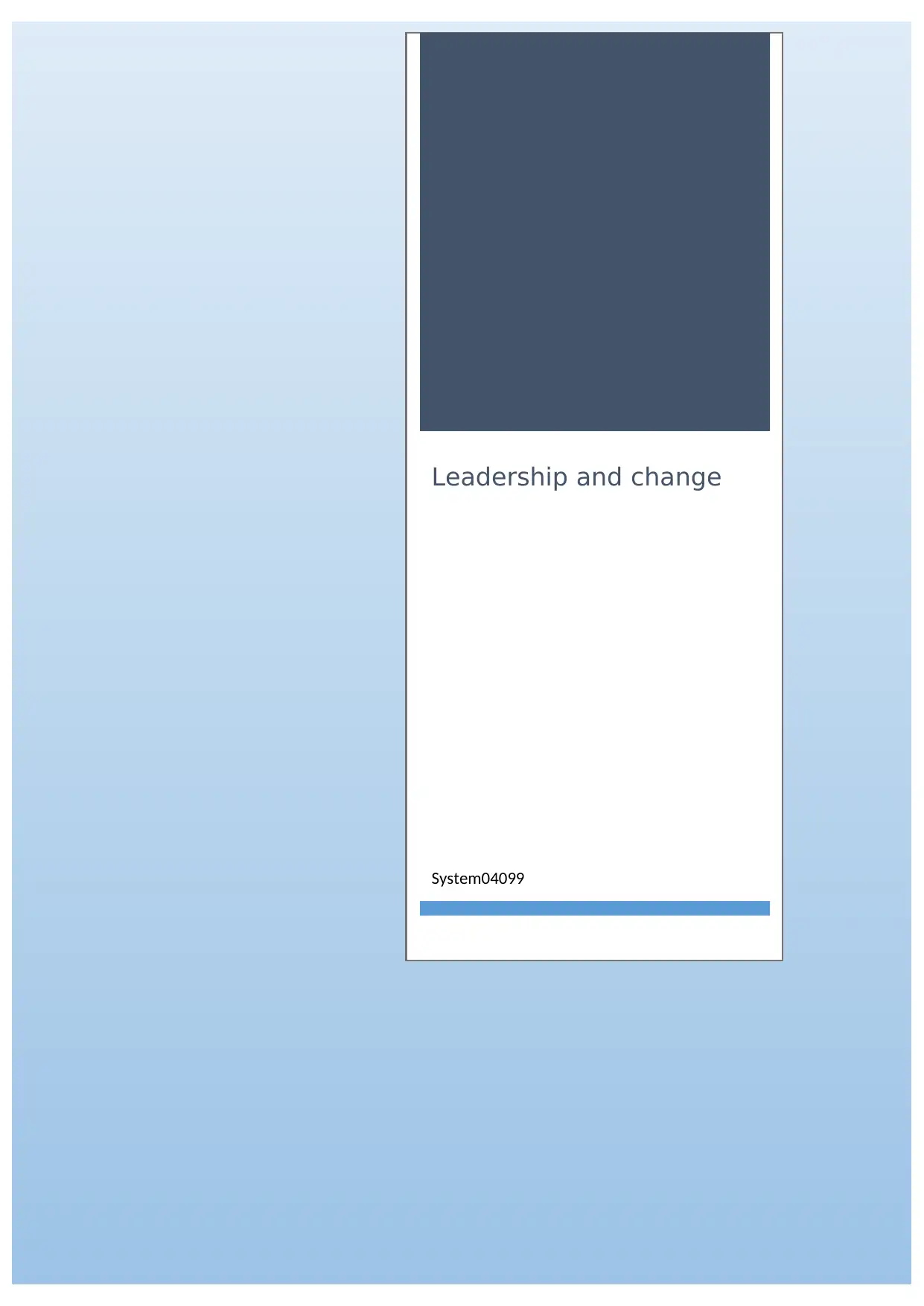
Leadership and change
System04099
System04099
Paraphrase This Document
Need a fresh take? Get an instant paraphrase of this document with our AI Paraphraser

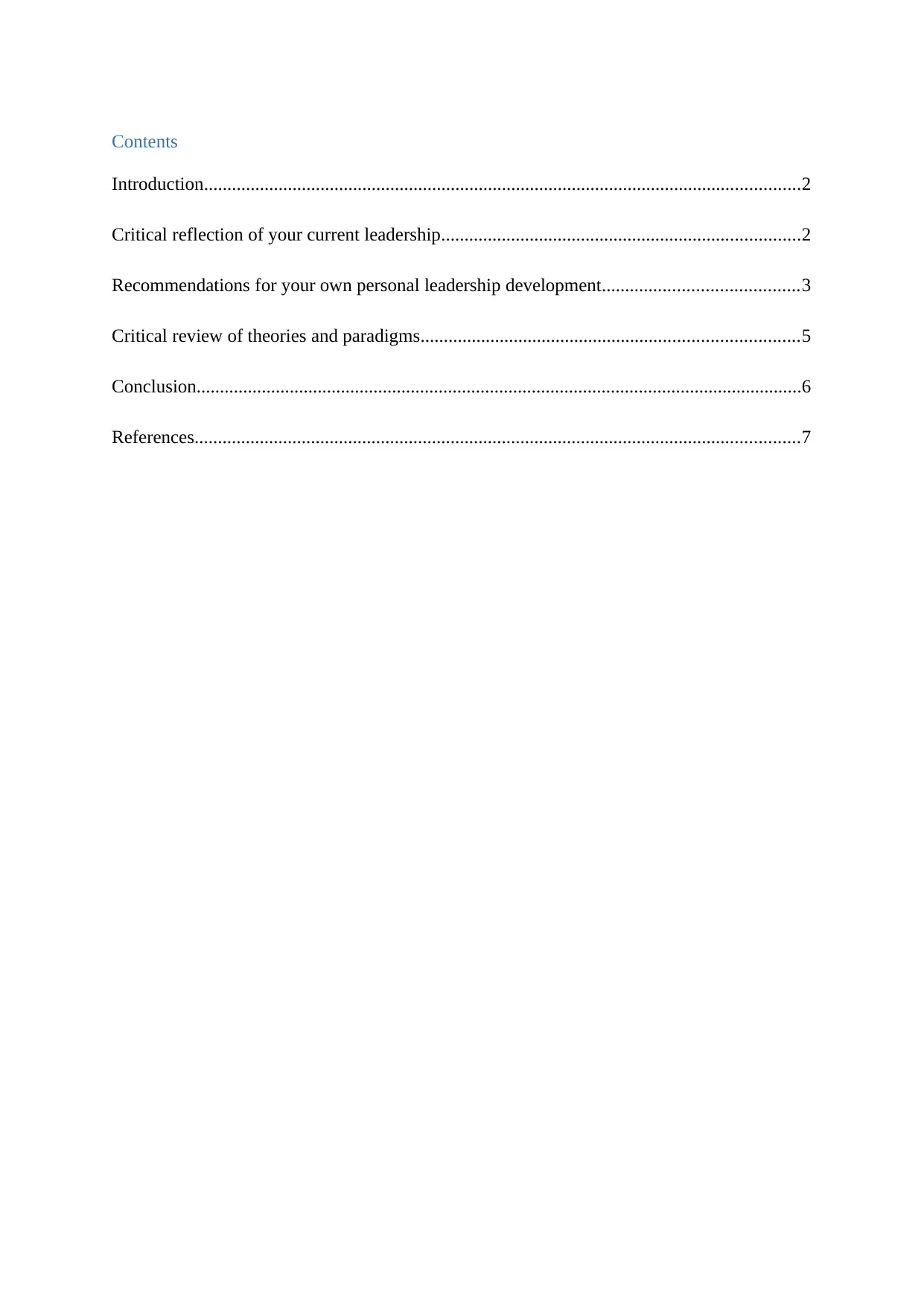
Contents
Introduction................................................................................................................................2
Critical reflection of your current leadership.............................................................................2
Recommendations for your own personal leadership development..........................................3
Critical review of theories and paradigms.................................................................................5
Conclusion..................................................................................................................................6
References..................................................................................................................................7
Introduction................................................................................................................................2
Critical reflection of your current leadership.............................................................................2
Recommendations for your own personal leadership development..........................................3
Critical review of theories and paradigms.................................................................................5
Conclusion..................................................................................................................................6
References..................................................................................................................................7
⊘ This is a preview!⊘
Do you want full access?
Subscribe today to unlock all pages.

Trusted by 1+ million students worldwide
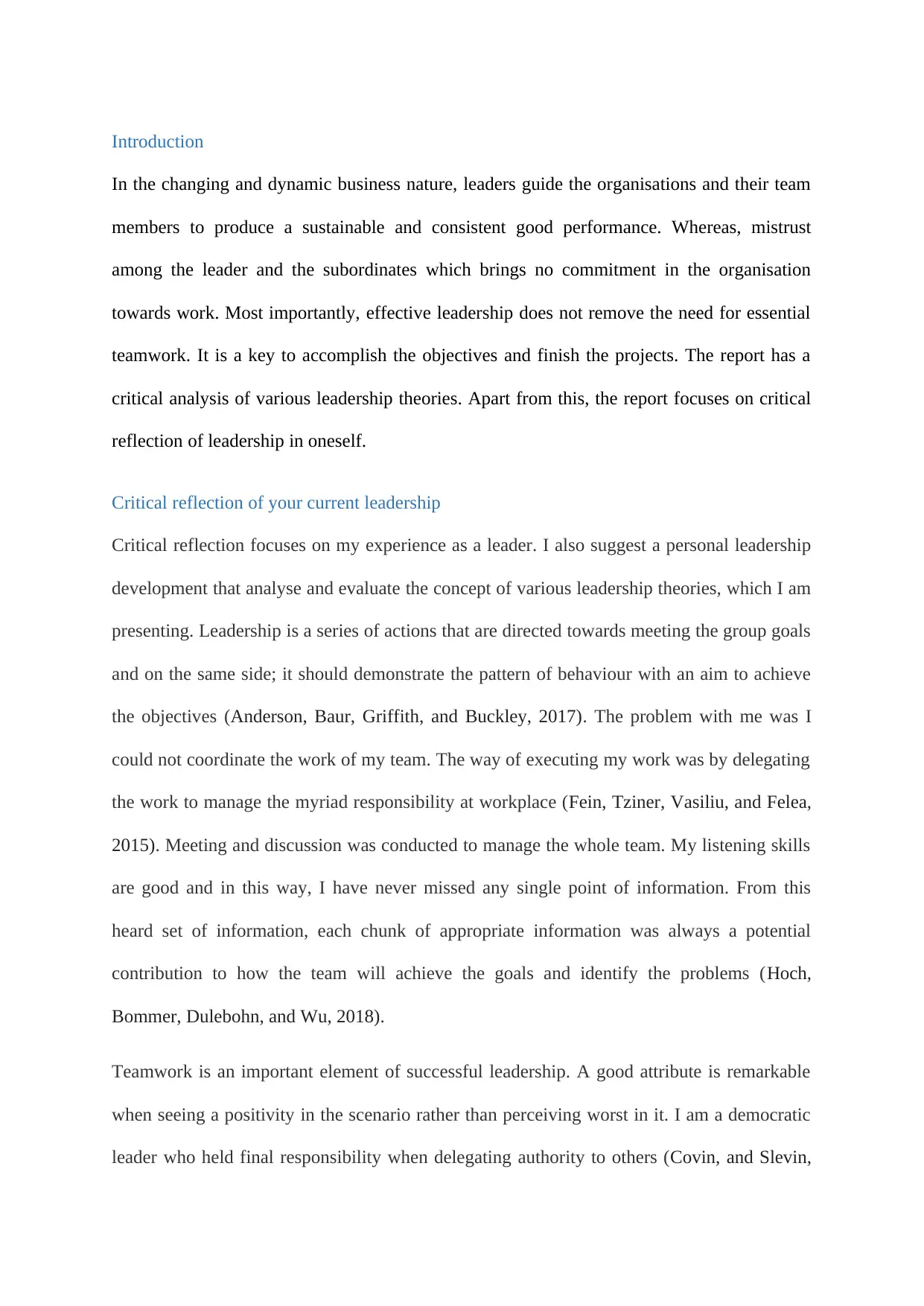
Introduction
In the changing and dynamic business nature, leaders guide the organisations and their team
members to produce a sustainable and consistent good performance. Whereas, mistrust
among the leader and the subordinates which brings no commitment in the organisation
towards work. Most importantly, effective leadership does not remove the need for essential
teamwork. It is a key to accomplish the objectives and finish the projects. The report has a
critical analysis of various leadership theories. Apart from this, the report focuses on critical
reflection of leadership in oneself.
Critical reflection of your current leadership
Critical reflection focuses on my experience as a leader. I also suggest a personal leadership
development that analyse and evaluate the concept of various leadership theories, which I am
presenting. Leadership is a series of actions that are directed towards meeting the group goals
and on the same side; it should demonstrate the pattern of behaviour with an aim to achieve
the objectives (Anderson, Baur, Griffith, and Buckley, 2017). The problem with me was I
could not coordinate the work of my team. The way of executing my work was by delegating
the work to manage the myriad responsibility at workplace (Fein, Tziner, Vasiliu, and Felea,
2015). Meeting and discussion was conducted to manage the whole team. My listening skills
are good and in this way, I have never missed any single point of information. From this
heard set of information, each chunk of appropriate information was always a potential
contribution to how the team will achieve the goals and identify the problems (Hoch,
Bommer, Dulebohn, and Wu, 2018).
Teamwork is an important element of successful leadership. A good attribute is remarkable
when seeing a positivity in the scenario rather than perceiving worst in it. I am a democratic
leader who held final responsibility when delegating authority to others (Covin, and Slevin,
In the changing and dynamic business nature, leaders guide the organisations and their team
members to produce a sustainable and consistent good performance. Whereas, mistrust
among the leader and the subordinates which brings no commitment in the organisation
towards work. Most importantly, effective leadership does not remove the need for essential
teamwork. It is a key to accomplish the objectives and finish the projects. The report has a
critical analysis of various leadership theories. Apart from this, the report focuses on critical
reflection of leadership in oneself.
Critical reflection of your current leadership
Critical reflection focuses on my experience as a leader. I also suggest a personal leadership
development that analyse and evaluate the concept of various leadership theories, which I am
presenting. Leadership is a series of actions that are directed towards meeting the group goals
and on the same side; it should demonstrate the pattern of behaviour with an aim to achieve
the objectives (Anderson, Baur, Griffith, and Buckley, 2017). The problem with me was I
could not coordinate the work of my team. The way of executing my work was by delegating
the work to manage the myriad responsibility at workplace (Fein, Tziner, Vasiliu, and Felea,
2015). Meeting and discussion was conducted to manage the whole team. My listening skills
are good and in this way, I have never missed any single point of information. From this
heard set of information, each chunk of appropriate information was always a potential
contribution to how the team will achieve the goals and identify the problems (Hoch,
Bommer, Dulebohn, and Wu, 2018).
Teamwork is an important element of successful leadership. A good attribute is remarkable
when seeing a positivity in the scenario rather than perceiving worst in it. I am a democratic
leader who held final responsibility when delegating authority to others (Covin, and Slevin,
Paraphrase This Document
Need a fresh take? Get an instant paraphrase of this document with our AI Paraphraser
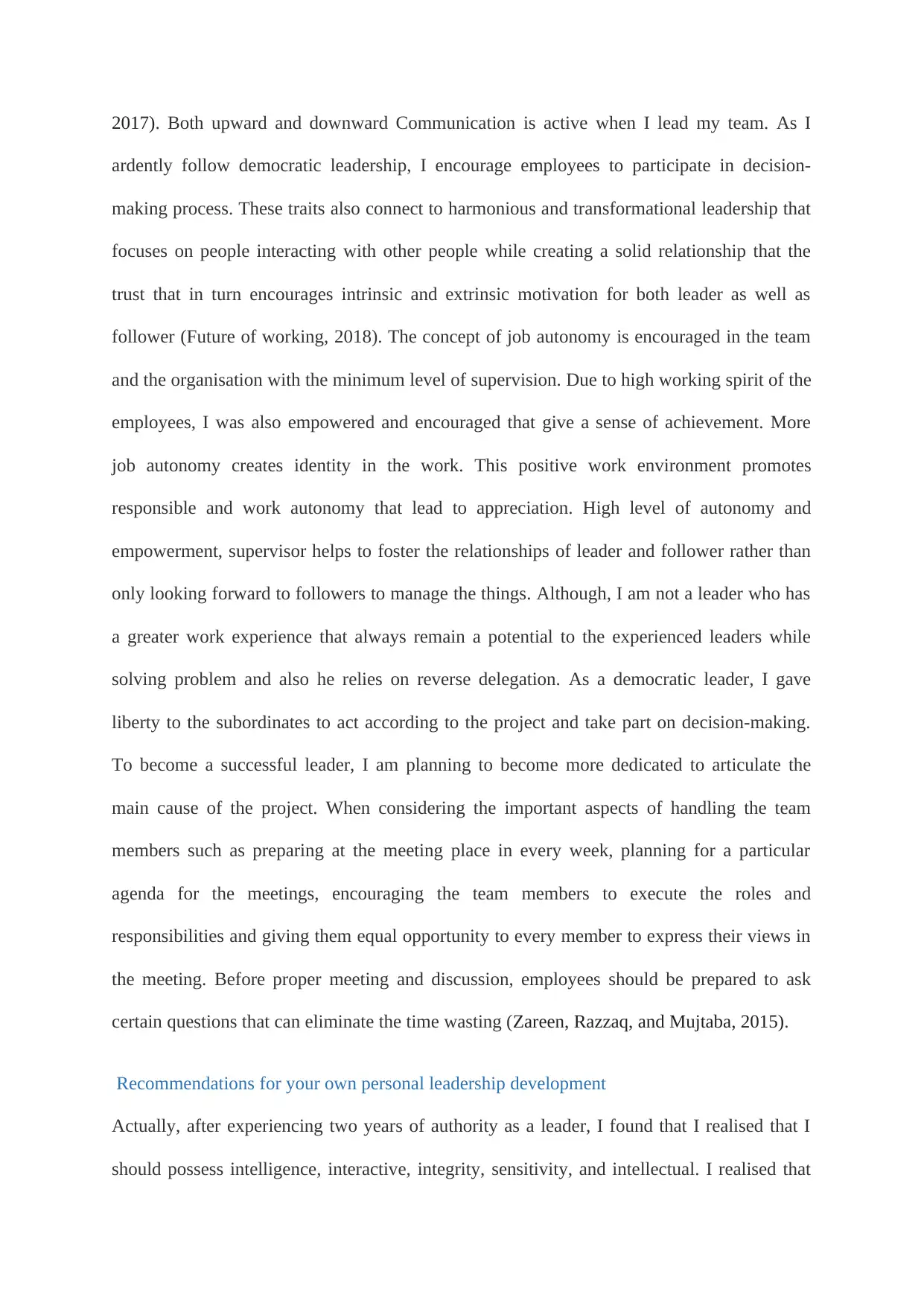
2017). Both upward and downward Communication is active when I lead my team. As I
ardently follow democratic leadership, I encourage employees to participate in decision-
making process. These traits also connect to harmonious and transformational leadership that
focuses on people interacting with other people while creating a solid relationship that the
trust that in turn encourages intrinsic and extrinsic motivation for both leader as well as
follower (Future of working, 2018). The concept of job autonomy is encouraged in the team
and the organisation with the minimum level of supervision. Due to high working spirit of the
employees, I was also empowered and encouraged that give a sense of achievement. More
job autonomy creates identity in the work. This positive work environment promotes
responsible and work autonomy that lead to appreciation. High level of autonomy and
empowerment, supervisor helps to foster the relationships of leader and follower rather than
only looking forward to followers to manage the things. Although, I am not a leader who has
a greater work experience that always remain a potential to the experienced leaders while
solving problem and also he relies on reverse delegation. As a democratic leader, I gave
liberty to the subordinates to act according to the project and take part on decision-making.
To become a successful leader, I am planning to become more dedicated to articulate the
main cause of the project. When considering the important aspects of handling the team
members such as preparing at the meeting place in every week, planning for a particular
agenda for the meetings, encouraging the team members to execute the roles and
responsibilities and giving them equal opportunity to every member to express their views in
the meeting. Before proper meeting and discussion, employees should be prepared to ask
certain questions that can eliminate the time wasting (Zareen, Razzaq, and Mujtaba, 2015).
Recommendations for your own personal leadership development
Actually, after experiencing two years of authority as a leader, I found that I realised that I
should possess intelligence, interactive, integrity, sensitivity, and intellectual. I realised that
ardently follow democratic leadership, I encourage employees to participate in decision-
making process. These traits also connect to harmonious and transformational leadership that
focuses on people interacting with other people while creating a solid relationship that the
trust that in turn encourages intrinsic and extrinsic motivation for both leader as well as
follower (Future of working, 2018). The concept of job autonomy is encouraged in the team
and the organisation with the minimum level of supervision. Due to high working spirit of the
employees, I was also empowered and encouraged that give a sense of achievement. More
job autonomy creates identity in the work. This positive work environment promotes
responsible and work autonomy that lead to appreciation. High level of autonomy and
empowerment, supervisor helps to foster the relationships of leader and follower rather than
only looking forward to followers to manage the things. Although, I am not a leader who has
a greater work experience that always remain a potential to the experienced leaders while
solving problem and also he relies on reverse delegation. As a democratic leader, I gave
liberty to the subordinates to act according to the project and take part on decision-making.
To become a successful leader, I am planning to become more dedicated to articulate the
main cause of the project. When considering the important aspects of handling the team
members such as preparing at the meeting place in every week, planning for a particular
agenda for the meetings, encouraging the team members to execute the roles and
responsibilities and giving them equal opportunity to every member to express their views in
the meeting. Before proper meeting and discussion, employees should be prepared to ask
certain questions that can eliminate the time wasting (Zareen, Razzaq, and Mujtaba, 2015).
Recommendations for your own personal leadership development
Actually, after experiencing two years of authority as a leader, I found that I realised that I
should possess intelligence, interactive, integrity, sensitivity, and intellectual. I realised that
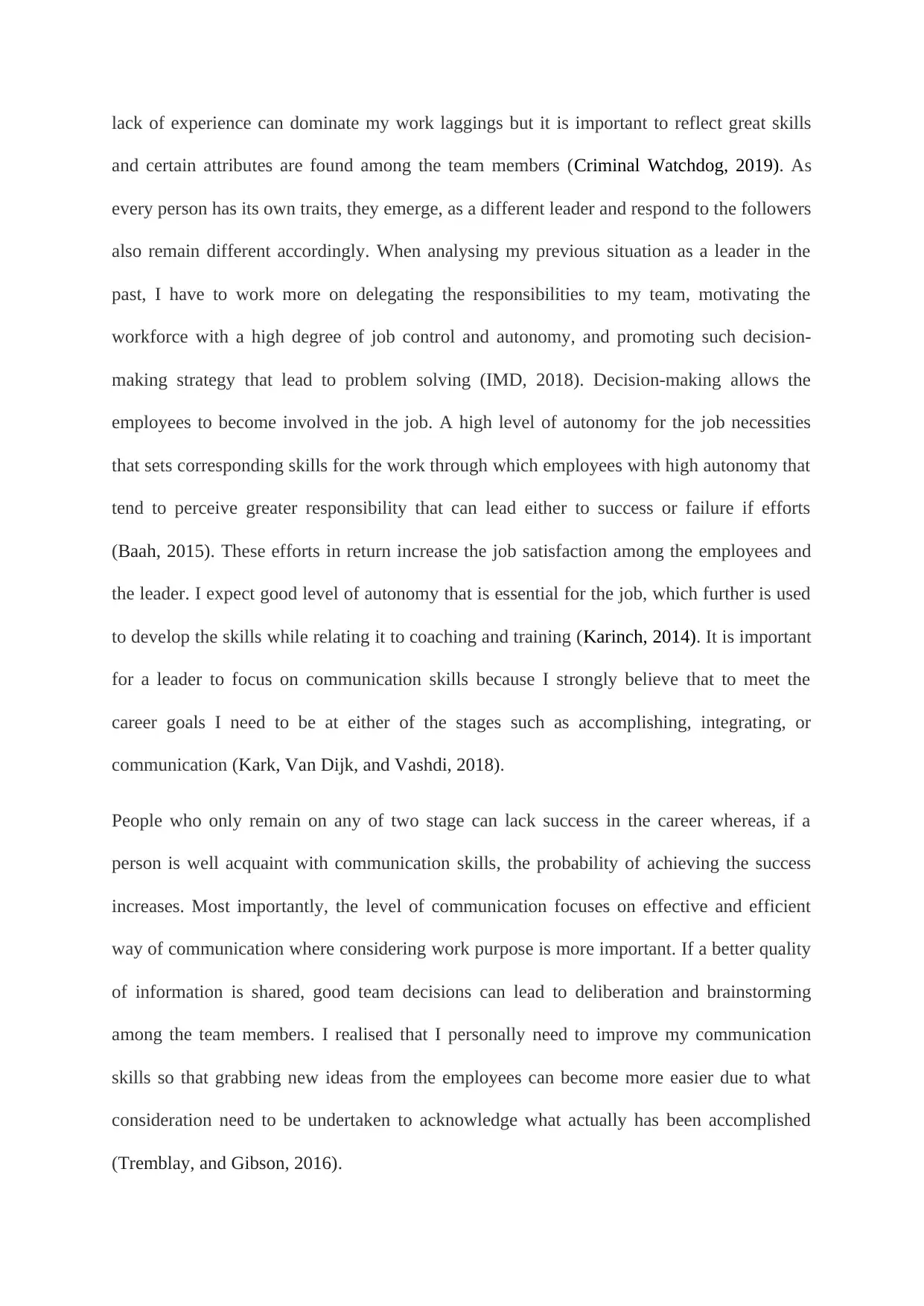
lack of experience can dominate my work laggings but it is important to reflect great skills
and certain attributes are found among the team members (Criminal Watchdog, 2019). As
every person has its own traits, they emerge, as a different leader and respond to the followers
also remain different accordingly. When analysing my previous situation as a leader in the
past, I have to work more on delegating the responsibilities to my team, motivating the
workforce with a high degree of job control and autonomy, and promoting such decision-
making strategy that lead to problem solving (IMD, 2018). Decision-making allows the
employees to become involved in the job. A high level of autonomy for the job necessities
that sets corresponding skills for the work through which employees with high autonomy that
tend to perceive greater responsibility that can lead either to success or failure if efforts
(Baah, 2015). These efforts in return increase the job satisfaction among the employees and
the leader. I expect good level of autonomy that is essential for the job, which further is used
to develop the skills while relating it to coaching and training (Karinch, 2014). It is important
for a leader to focus on communication skills because I strongly believe that to meet the
career goals I need to be at either of the stages such as accomplishing, integrating, or
communication (Kark, Van Dijk, and Vashdi, 2018).
People who only remain on any of two stage can lack success in the career whereas, if a
person is well acquaint with communication skills, the probability of achieving the success
increases. Most importantly, the level of communication focuses on effective and efficient
way of communication where considering work purpose is more important. If a better quality
of information is shared, good team decisions can lead to deliberation and brainstorming
among the team members. I realised that I personally need to improve my communication
skills so that grabbing new ideas from the employees can become more easier due to what
consideration need to be undertaken to acknowledge what actually has been accomplished
(Tremblay, and Gibson, 2016).
and certain attributes are found among the team members (Criminal Watchdog, 2019). As
every person has its own traits, they emerge, as a different leader and respond to the followers
also remain different accordingly. When analysing my previous situation as a leader in the
past, I have to work more on delegating the responsibilities to my team, motivating the
workforce with a high degree of job control and autonomy, and promoting such decision-
making strategy that lead to problem solving (IMD, 2018). Decision-making allows the
employees to become involved in the job. A high level of autonomy for the job necessities
that sets corresponding skills for the work through which employees with high autonomy that
tend to perceive greater responsibility that can lead either to success or failure if efforts
(Baah, 2015). These efforts in return increase the job satisfaction among the employees and
the leader. I expect good level of autonomy that is essential for the job, which further is used
to develop the skills while relating it to coaching and training (Karinch, 2014). It is important
for a leader to focus on communication skills because I strongly believe that to meet the
career goals I need to be at either of the stages such as accomplishing, integrating, or
communication (Kark, Van Dijk, and Vashdi, 2018).
People who only remain on any of two stage can lack success in the career whereas, if a
person is well acquaint with communication skills, the probability of achieving the success
increases. Most importantly, the level of communication focuses on effective and efficient
way of communication where considering work purpose is more important. If a better quality
of information is shared, good team decisions can lead to deliberation and brainstorming
among the team members. I realised that I personally need to improve my communication
skills so that grabbing new ideas from the employees can become more easier due to what
consideration need to be undertaken to acknowledge what actually has been accomplished
(Tremblay, and Gibson, 2016).
⊘ This is a preview!⊘
Do you want full access?
Subscribe today to unlock all pages.

Trusted by 1+ million students worldwide
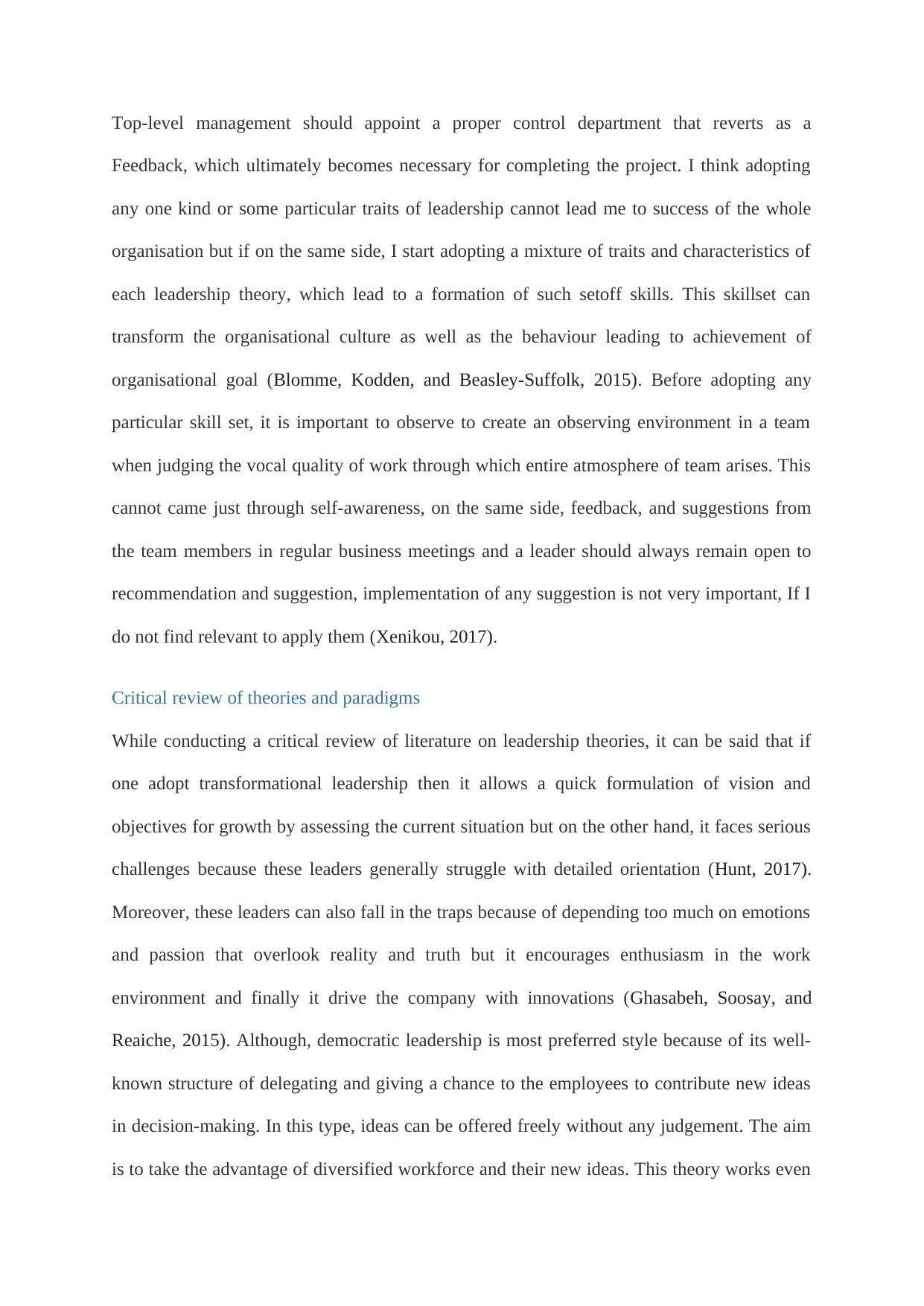
Top-level management should appoint a proper control department that reverts as a
Feedback, which ultimately becomes necessary for completing the project. I think adopting
any one kind or some particular traits of leadership cannot lead me to success of the whole
organisation but if on the same side, I start adopting a mixture of traits and characteristics of
each leadership theory, which lead to a formation of such setoff skills. This skillset can
transform the organisational culture as well as the behaviour leading to achievement of
organisational goal (Blomme, Kodden, and Beasley-Suffolk, 2015). Before adopting any
particular skill set, it is important to observe to create an observing environment in a team
when judging the vocal quality of work through which entire atmosphere of team arises. This
cannot came just through self-awareness, on the same side, feedback, and suggestions from
the team members in regular business meetings and a leader should always remain open to
recommendation and suggestion, implementation of any suggestion is not very important, If I
do not find relevant to apply them (Xenikou, 2017).
Critical review of theories and paradigms
While conducting a critical review of literature on leadership theories, it can be said that if
one adopt transformational leadership then it allows a quick formulation of vision and
objectives for growth by assessing the current situation but on the other hand, it faces serious
challenges because these leaders generally struggle with detailed orientation (Hunt, 2017).
Moreover, these leaders can also fall in the traps because of depending too much on emotions
and passion that overlook reality and truth but it encourages enthusiasm in the work
environment and finally it drive the company with innovations (Ghasabeh, Soosay, and
Reaiche, 2015). Although, democratic leadership is most preferred style because of its well-
known structure of delegating and giving a chance to the employees to contribute new ideas
in decision-making. In this type, ideas can be offered freely without any judgement. The aim
is to take the advantage of diversified workforce and their new ideas. This theory works even
Feedback, which ultimately becomes necessary for completing the project. I think adopting
any one kind or some particular traits of leadership cannot lead me to success of the whole
organisation but if on the same side, I start adopting a mixture of traits and characteristics of
each leadership theory, which lead to a formation of such setoff skills. This skillset can
transform the organisational culture as well as the behaviour leading to achievement of
organisational goal (Blomme, Kodden, and Beasley-Suffolk, 2015). Before adopting any
particular skill set, it is important to observe to create an observing environment in a team
when judging the vocal quality of work through which entire atmosphere of team arises. This
cannot came just through self-awareness, on the same side, feedback, and suggestions from
the team members in regular business meetings and a leader should always remain open to
recommendation and suggestion, implementation of any suggestion is not very important, If I
do not find relevant to apply them (Xenikou, 2017).
Critical review of theories and paradigms
While conducting a critical review of literature on leadership theories, it can be said that if
one adopt transformational leadership then it allows a quick formulation of vision and
objectives for growth by assessing the current situation but on the other hand, it faces serious
challenges because these leaders generally struggle with detailed orientation (Hunt, 2017).
Moreover, these leaders can also fall in the traps because of depending too much on emotions
and passion that overlook reality and truth but it encourages enthusiasm in the work
environment and finally it drive the company with innovations (Ghasabeh, Soosay, and
Reaiche, 2015). Although, democratic leadership is most preferred style because of its well-
known structure of delegating and giving a chance to the employees to contribute new ideas
in decision-making. In this type, ideas can be offered freely without any judgement. The aim
is to take the advantage of diversified workforce and their new ideas. This theory works even
Paraphrase This Document
Need a fresh take? Get an instant paraphrase of this document with our AI Paraphraser
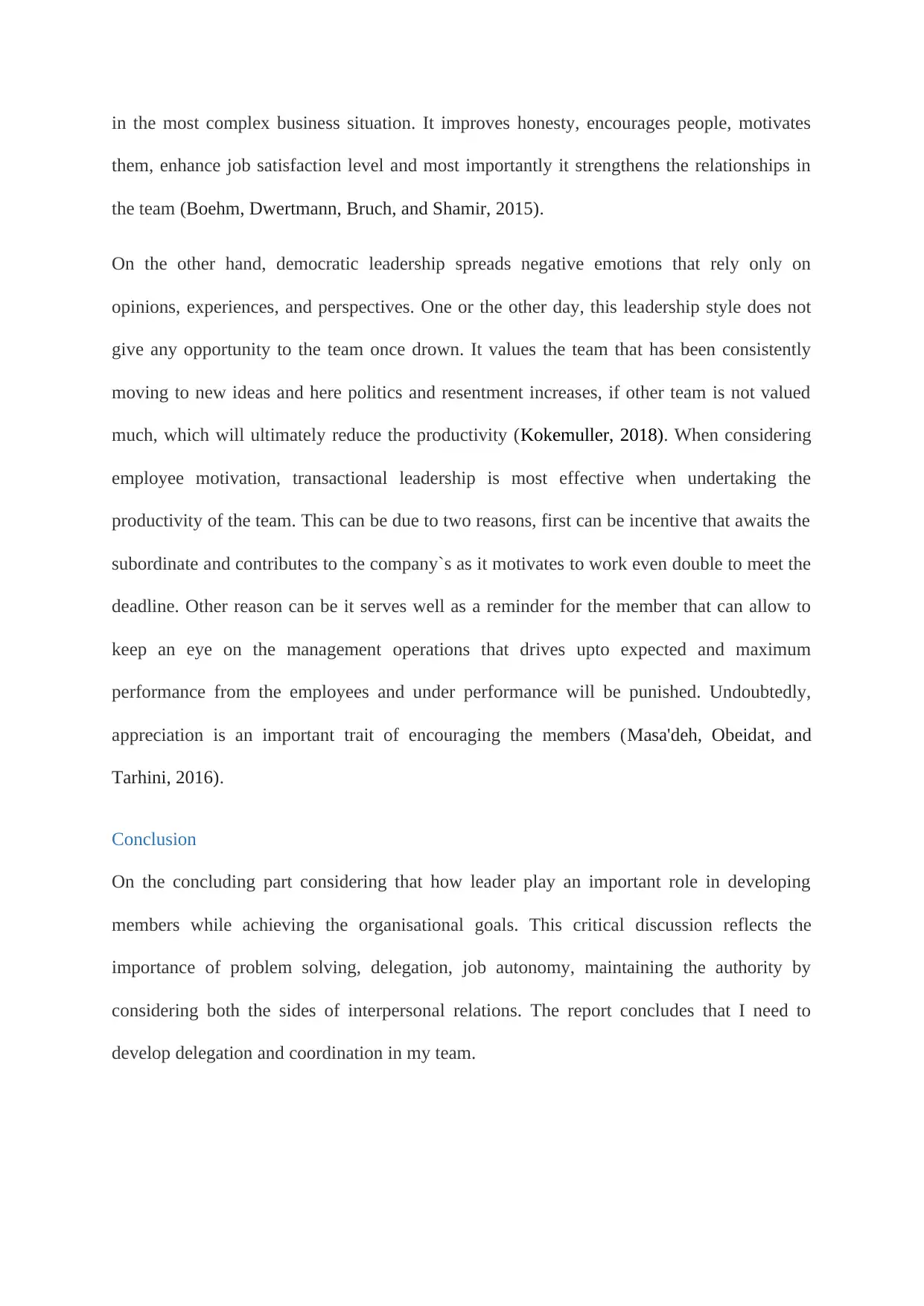
in the most complex business situation. It improves honesty, encourages people, motivates
them, enhance job satisfaction level and most importantly it strengthens the relationships in
the team (Boehm, Dwertmann, Bruch, and Shamir, 2015).
On the other hand, democratic leadership spreads negative emotions that rely only on
opinions, experiences, and perspectives. One or the other day, this leadership style does not
give any opportunity to the team once drown. It values the team that has been consistently
moving to new ideas and here politics and resentment increases, if other team is not valued
much, which will ultimately reduce the productivity (Kokemuller, 2018). When considering
employee motivation, transactional leadership is most effective when undertaking the
productivity of the team. This can be due to two reasons, first can be incentive that awaits the
subordinate and contributes to the company`s as it motivates to work even double to meet the
deadline. Other reason can be it serves well as a reminder for the member that can allow to
keep an eye on the management operations that drives upto expected and maximum
performance from the employees and under performance will be punished. Undoubtedly,
appreciation is an important trait of encouraging the members (Masa'deh, Obeidat, and
Tarhini, 2016).
Conclusion
On the concluding part considering that how leader play an important role in developing
members while achieving the organisational goals. This critical discussion reflects the
importance of problem solving, delegation, job autonomy, maintaining the authority by
considering both the sides of interpersonal relations. The report concludes that I need to
develop delegation and coordination in my team.
them, enhance job satisfaction level and most importantly it strengthens the relationships in
the team (Boehm, Dwertmann, Bruch, and Shamir, 2015).
On the other hand, democratic leadership spreads negative emotions that rely only on
opinions, experiences, and perspectives. One or the other day, this leadership style does not
give any opportunity to the team once drown. It values the team that has been consistently
moving to new ideas and here politics and resentment increases, if other team is not valued
much, which will ultimately reduce the productivity (Kokemuller, 2018). When considering
employee motivation, transactional leadership is most effective when undertaking the
productivity of the team. This can be due to two reasons, first can be incentive that awaits the
subordinate and contributes to the company`s as it motivates to work even double to meet the
deadline. Other reason can be it serves well as a reminder for the member that can allow to
keep an eye on the management operations that drives upto expected and maximum
performance from the employees and under performance will be punished. Undoubtedly,
appreciation is an important trait of encouraging the members (Masa'deh, Obeidat, and
Tarhini, 2016).
Conclusion
On the concluding part considering that how leader play an important role in developing
members while achieving the organisational goals. This critical discussion reflects the
importance of problem solving, delegation, job autonomy, maintaining the authority by
considering both the sides of interpersonal relations. The report concludes that I need to
develop delegation and coordination in my team.
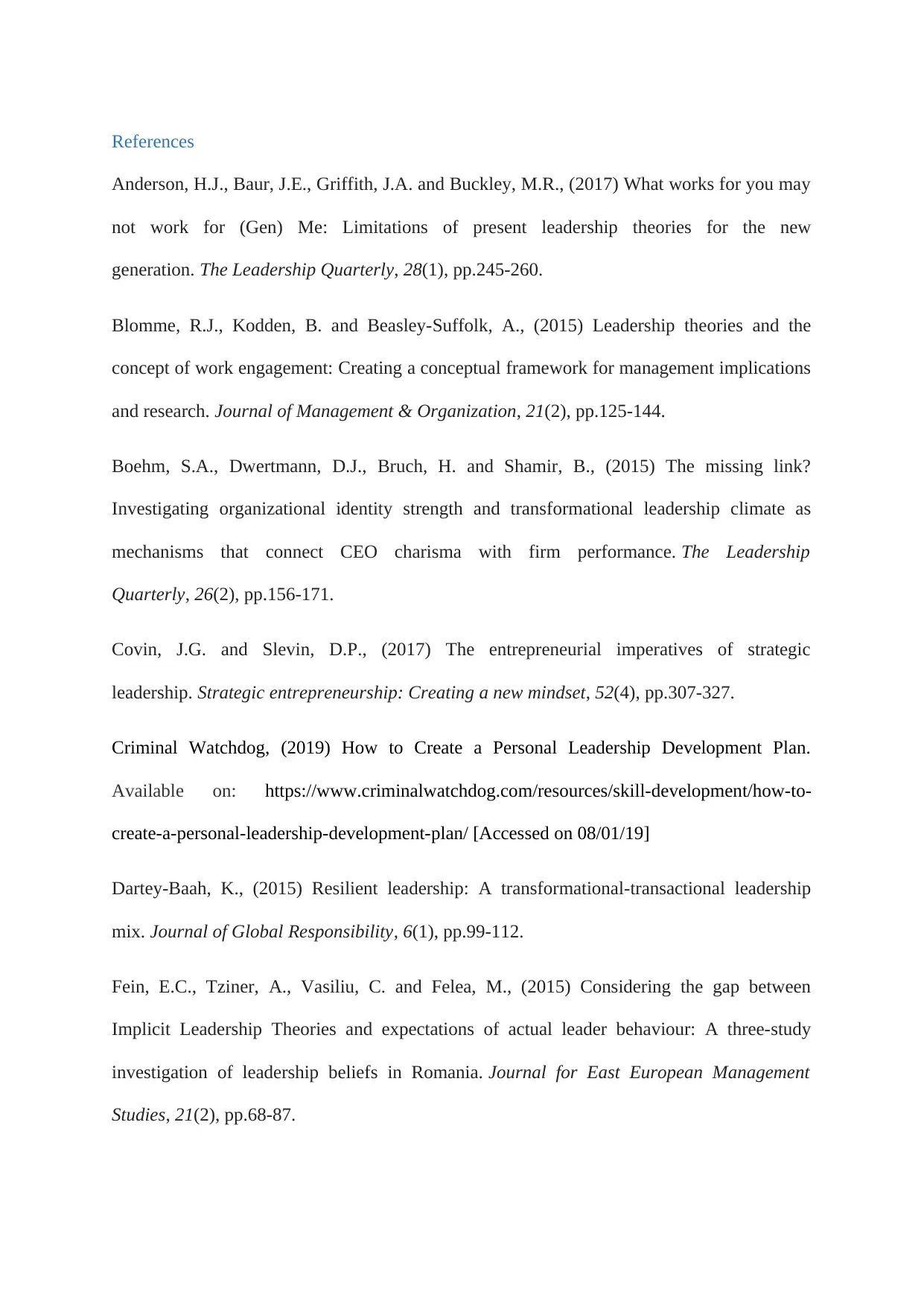
References
Anderson, H.J., Baur, J.E., Griffith, J.A. and Buckley, M.R., (2017) What works for you may
not work for (Gen) Me: Limitations of present leadership theories for the new
generation. The Leadership Quarterly, 28(1), pp.245-260.
Blomme, R.J., Kodden, B. and Beasley-Suffolk, A., (2015) Leadership theories and the
concept of work engagement: Creating a conceptual framework for management implications
and research. Journal of Management & Organization, 21(2), pp.125-144.
Boehm, S.A., Dwertmann, D.J., Bruch, H. and Shamir, B., (2015) The missing link?
Investigating organizational identity strength and transformational leadership climate as
mechanisms that connect CEO charisma with firm performance. The Leadership
Quarterly, 26(2), pp.156-171.
Covin, J.G. and Slevin, D.P., (2017) The entrepreneurial imperatives of strategic
leadership. Strategic entrepreneurship: Creating a new mindset, 52(4), pp.307-327.
Criminal Watchdog, (2019) How to Create a Personal Leadership Development Plan.
Available on: https://www.criminalwatchdog.com/resources/skill-development/how-to-
create-a-personal-leadership-development-plan/ [Accessed on 08/01/19]
Dartey-Baah, K., (2015) Resilient leadership: A transformational-transactional leadership
mix. Journal of Global Responsibility, 6(1), pp.99-112.
Fein, E.C., Tziner, A., Vasiliu, C. and Felea, M., (2015) Considering the gap between
Implicit Leadership Theories and expectations of actual leader behaviour: A three-study
investigation of leadership beliefs in Romania. Journal for East European Management
Studies, 21(2), pp.68-87.
Anderson, H.J., Baur, J.E., Griffith, J.A. and Buckley, M.R., (2017) What works for you may
not work for (Gen) Me: Limitations of present leadership theories for the new
generation. The Leadership Quarterly, 28(1), pp.245-260.
Blomme, R.J., Kodden, B. and Beasley-Suffolk, A., (2015) Leadership theories and the
concept of work engagement: Creating a conceptual framework for management implications
and research. Journal of Management & Organization, 21(2), pp.125-144.
Boehm, S.A., Dwertmann, D.J., Bruch, H. and Shamir, B., (2015) The missing link?
Investigating organizational identity strength and transformational leadership climate as
mechanisms that connect CEO charisma with firm performance. The Leadership
Quarterly, 26(2), pp.156-171.
Covin, J.G. and Slevin, D.P., (2017) The entrepreneurial imperatives of strategic
leadership. Strategic entrepreneurship: Creating a new mindset, 52(4), pp.307-327.
Criminal Watchdog, (2019) How to Create a Personal Leadership Development Plan.
Available on: https://www.criminalwatchdog.com/resources/skill-development/how-to-
create-a-personal-leadership-development-plan/ [Accessed on 08/01/19]
Dartey-Baah, K., (2015) Resilient leadership: A transformational-transactional leadership
mix. Journal of Global Responsibility, 6(1), pp.99-112.
Fein, E.C., Tziner, A., Vasiliu, C. and Felea, M., (2015) Considering the gap between
Implicit Leadership Theories and expectations of actual leader behaviour: A three-study
investigation of leadership beliefs in Romania. Journal for East European Management
Studies, 21(2), pp.68-87.
⊘ This is a preview!⊘
Do you want full access?
Subscribe today to unlock all pages.

Trusted by 1+ million students worldwide
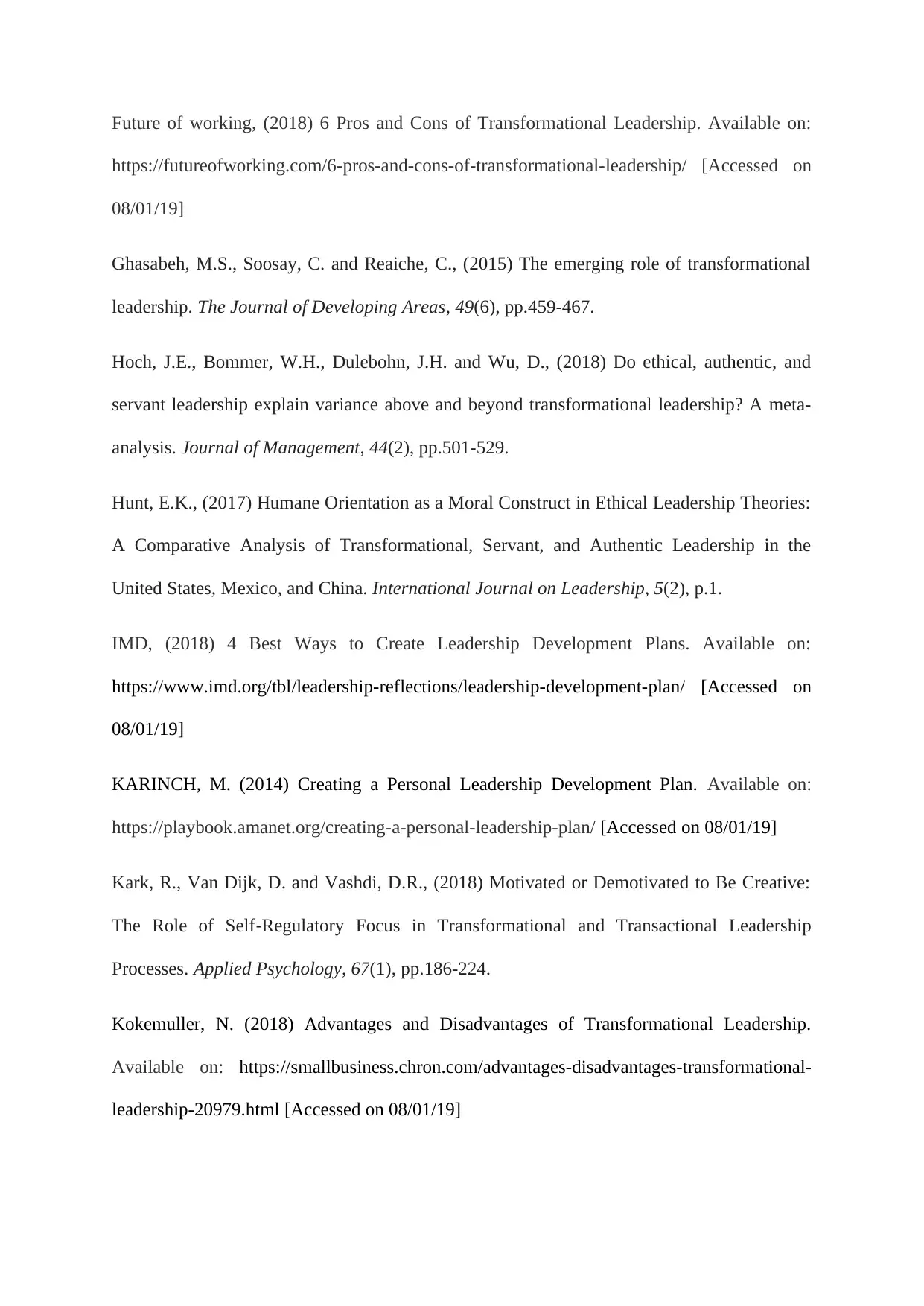
Future of working, (2018) 6 Pros and Cons of Transformational Leadership. Available on:
https://futureofworking.com/6-pros-and-cons-of-transformational-leadership/ [Accessed on
08/01/19]
Ghasabeh, M.S., Soosay, C. and Reaiche, C., (2015) The emerging role of transformational
leadership. The Journal of Developing Areas, 49(6), pp.459-467.
Hoch, J.E., Bommer, W.H., Dulebohn, J.H. and Wu, D., (2018) Do ethical, authentic, and
servant leadership explain variance above and beyond transformational leadership? A meta-
analysis. Journal of Management, 44(2), pp.501-529.
Hunt, E.K., (2017) Humane Orientation as a Moral Construct in Ethical Leadership Theories:
A Comparative Analysis of Transformational, Servant, and Authentic Leadership in the
United States, Mexico, and China. International Journal on Leadership, 5(2), p.1.
IMD, (2018) 4 Best Ways to Create Leadership Development Plans. Available on:
https://www.imd.org/tbl/leadership-reflections/leadership-development-plan/ [Accessed on
08/01/19]
KARINCH, M. (2014) Creating a Personal Leadership Development Plan. Available on:
https://playbook.amanet.org/creating-a-personal-leadership-plan/ [Accessed on 08/01/19]
Kark, R., Van Dijk, D. and Vashdi, D.R., (2018) Motivated or Demotivated to Be Creative:
The Role of Self‐Regulatory Focus in Transformational and Transactional Leadership
Processes. Applied Psychology, 67(1), pp.186-224.
Kokemuller, N. (2018) Advantages and Disadvantages of Transformational Leadership.
Available on: https://smallbusiness.chron.com/advantages-disadvantages-transformational-
leadership-20979.html [Accessed on 08/01/19]
https://futureofworking.com/6-pros-and-cons-of-transformational-leadership/ [Accessed on
08/01/19]
Ghasabeh, M.S., Soosay, C. and Reaiche, C., (2015) The emerging role of transformational
leadership. The Journal of Developing Areas, 49(6), pp.459-467.
Hoch, J.E., Bommer, W.H., Dulebohn, J.H. and Wu, D., (2018) Do ethical, authentic, and
servant leadership explain variance above and beyond transformational leadership? A meta-
analysis. Journal of Management, 44(2), pp.501-529.
Hunt, E.K., (2017) Humane Orientation as a Moral Construct in Ethical Leadership Theories:
A Comparative Analysis of Transformational, Servant, and Authentic Leadership in the
United States, Mexico, and China. International Journal on Leadership, 5(2), p.1.
IMD, (2018) 4 Best Ways to Create Leadership Development Plans. Available on:
https://www.imd.org/tbl/leadership-reflections/leadership-development-plan/ [Accessed on
08/01/19]
KARINCH, M. (2014) Creating a Personal Leadership Development Plan. Available on:
https://playbook.amanet.org/creating-a-personal-leadership-plan/ [Accessed on 08/01/19]
Kark, R., Van Dijk, D. and Vashdi, D.R., (2018) Motivated or Demotivated to Be Creative:
The Role of Self‐Regulatory Focus in Transformational and Transactional Leadership
Processes. Applied Psychology, 67(1), pp.186-224.
Kokemuller, N. (2018) Advantages and Disadvantages of Transformational Leadership.
Available on: https://smallbusiness.chron.com/advantages-disadvantages-transformational-
leadership-20979.html [Accessed on 08/01/19]
Paraphrase This Document
Need a fresh take? Get an instant paraphrase of this document with our AI Paraphraser
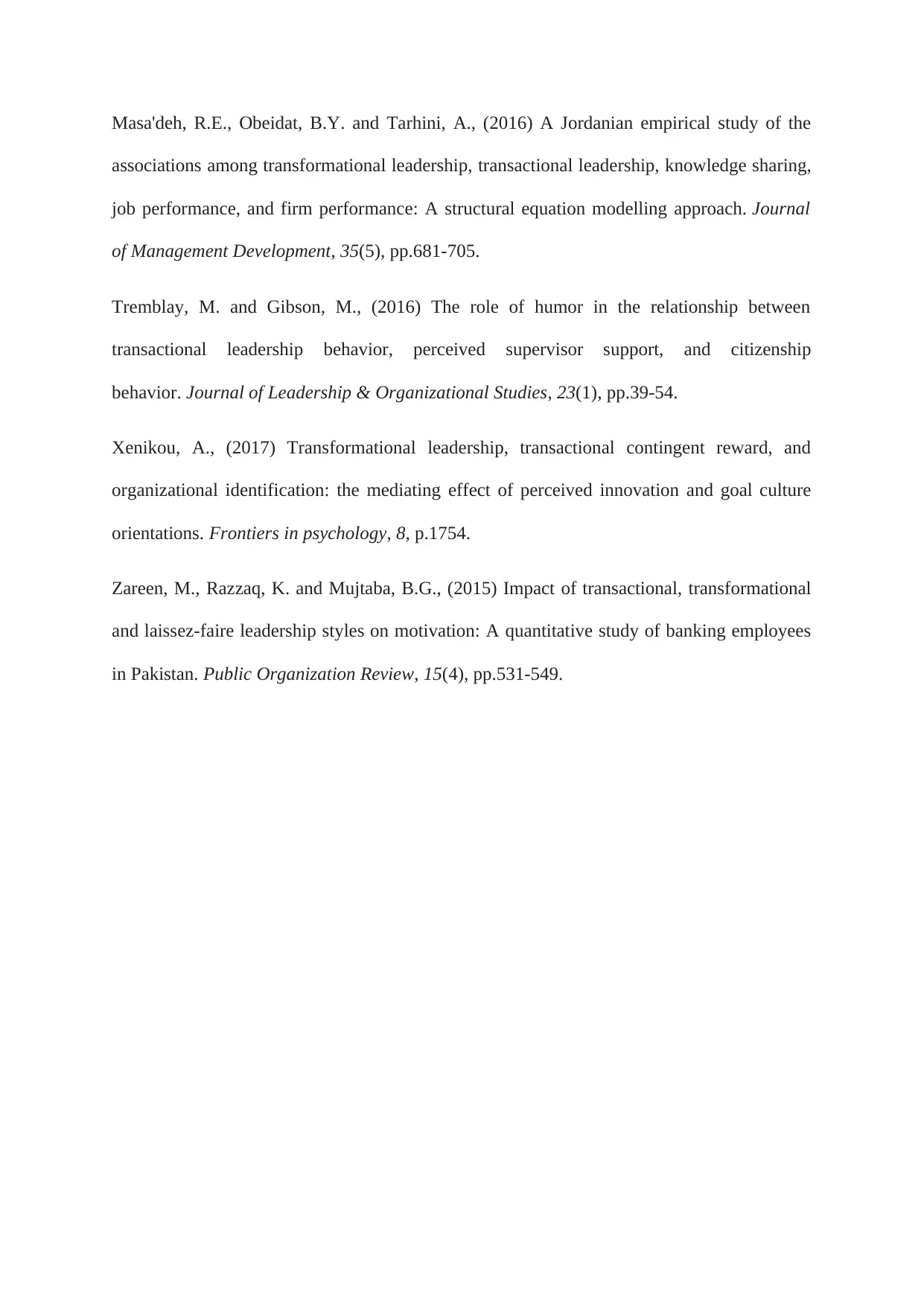
Masa'deh, R.E., Obeidat, B.Y. and Tarhini, A., (2016) A Jordanian empirical study of the
associations among transformational leadership, transactional leadership, knowledge sharing,
job performance, and firm performance: A structural equation modelling approach. Journal
of Management Development, 35(5), pp.681-705.
Tremblay, M. and Gibson, M., (2016) The role of humor in the relationship between
transactional leadership behavior, perceived supervisor support, and citizenship
behavior. Journal of Leadership & Organizational Studies, 23(1), pp.39-54.
Xenikou, A., (2017) Transformational leadership, transactional contingent reward, and
organizational identification: the mediating effect of perceived innovation and goal culture
orientations. Frontiers in psychology, 8, p.1754.
Zareen, M., Razzaq, K. and Mujtaba, B.G., (2015) Impact of transactional, transformational
and laissez-faire leadership styles on motivation: A quantitative study of banking employees
in Pakistan. Public Organization Review, 15(4), pp.531-549.
associations among transformational leadership, transactional leadership, knowledge sharing,
job performance, and firm performance: A structural equation modelling approach. Journal
of Management Development, 35(5), pp.681-705.
Tremblay, M. and Gibson, M., (2016) The role of humor in the relationship between
transactional leadership behavior, perceived supervisor support, and citizenship
behavior. Journal of Leadership & Organizational Studies, 23(1), pp.39-54.
Xenikou, A., (2017) Transformational leadership, transactional contingent reward, and
organizational identification: the mediating effect of perceived innovation and goal culture
orientations. Frontiers in psychology, 8, p.1754.
Zareen, M., Razzaq, K. and Mujtaba, B.G., (2015) Impact of transactional, transformational
and laissez-faire leadership styles on motivation: A quantitative study of banking employees
in Pakistan. Public Organization Review, 15(4), pp.531-549.
1 out of 11
Related Documents
Your All-in-One AI-Powered Toolkit for Academic Success.
+13062052269
info@desklib.com
Available 24*7 on WhatsApp / Email
![[object Object]](/_next/static/media/star-bottom.7253800d.svg)
Unlock your academic potential
Copyright © 2020–2026 A2Z Services. All Rights Reserved. Developed and managed by ZUCOL.





